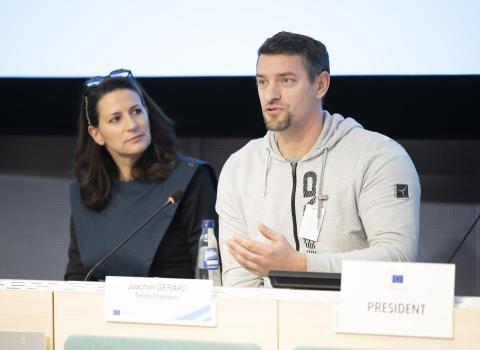The European Economic and Social Committee (EESC) held a debate to celebrate both the International Day of Persons with Disabilities and Olympic spirit during its plenary session on 5 December in Brussels.
The successes of Paralympic athletes are evidence of the terrific progress made in recent years in terms of including people with disabilities. However, the European Union needs to do much more to promote that inclusion, and not just in the area of sports. During its December plenary session, the EESC celebrated both the International Day of Persons with Disabilities and Olympic spirit by inviting guests belonging to the sphere of Paralympic athletic performance – including Belgian Paralympic athlete and champion, Joachim Gerard.
Opening the session, EESC president Oliver Röpke said that ‘This debate highlights the urgent need to address the employment gap faced by persons with disabilities. Despite the existing legal frameworks, far too many people are excluded from the labour market due to persistent barriers. The EESC calls for action to create inclusive workplaces, break down systemic obstacles and ensure equal opportunities for all. A truly inclusive Europe must leave no one behind.’
Aurel Laurenţiu Plosceanu, EESC vice-president responsible for communication, highlighted the EESC’s role in promoting the rights of persons with disabilities. He welcomed the distinguished guests, Joachim Gérard and Anne d’Ieteren, and said that ‘Their presence and track record remind us just how inspiring athletic excellence can be for all of us who strive to achieve our full potential, while also showing the vital role that persons with disabilities play in our society and in the sporting world in particular.’
During the debate, Joachim Gérard, a Belgian wheelchair tennis player and champion, said that when he first started playing tennis, he was often greeted with surprise and even protests that he would ‘ruin the court’ with his wheelchair. ‘In the last 10 years, we have seen huge progress in the role of people with reduced mobility in the world of sports. I have played in a number of Grand Slams around the world, and through these games and the Paralympics, I feel that I am becoming more and more accepted as a top level athlete. Not just as a Paralympic athlete, but a top-level athlete.’
However, the picture of sports for people with disabilities is not all rosy. Anne d’Ieteren, President of the French-speaking League for Disabled Sports (La Ligue Handisport Francophone), pointed out that despite the great successes demonstrated by the Paralympic Games, there are still many obstacles in the daily lives of people with disabilities. ‘A significant number of sports facilities are still inaccessible, with inadequate parking spots or poor design. These may seem like small problems, but their cumulative effect can exclude and discourage participation.’
Participants in the EESC debate said that celebrating the remarkable achievements of people with disabilities in sports could be an incentive for the EU, its authorities and civil society to explore methods of inclusion beyond sports, such as in the arts, culture and politics. It was pointed out that in some European countries, people with disabilities face problems in terms of access to polling stations to vote (for instance, lack of transport), access to justice (especially for people with intellectual disabilities) and even forced sterilisation practices. Christophe Lefèvre, President of the EESC’s Permanent Group on Disability Rights, argued for the establishment of an EU accessibility mechanism with accessibility indicators, covering areas such as sustainable housing, sports, justice and education.
Pietro Vittorio Barbieri of the EESC’s Permanent Group on Disability Rights drew attention to the plight of people in Ukraine. ‘We have to make sure that we take into account the needs of the most vulnerable in our society. There are 150 000 children in Ukraine who suffer from disabilities and have very difficult living situations.’ He added that ‘It is essential that all disabled people living in Europe have access to sports and education, so that we are all guaranteed the same privileges within society.’
The EESC’s work on sports and disabilities
The EESC has supported persons with disabilities and highlighted the key link between sports and the integration of persons with disabilities within society through key actions and opinions.
In its opinion on Sport and European Values, drawn up by Bernardo Hernández Bataller, the EESC says that sport helps meet the EU’s strategic objectives, brings to the fore key educational and cultural values and is a conduit of integration, since it is open to all members of the public, regardless of their gender, ethnic origin, religion, age, nationality, social situation or sexual orientation. Sport has a pivotal role to play as a tool for tackling intolerance, xenophobia and racism. In the opinion, the EESC calls on the EU to use sport to promote social cohesion.
In 2022, the EESC’s work on sport focused on its opinion on The EU action for Post COVID-19 period: recovering better through sport, prepared by Pietro Barbieri. After the lengthy pandemic which hit both the sports sector as a whole and local sports clubs particularly hard, the Committee argued that a strategic approach was needed to boost and promote the role of sports and physical activity in building a more resilient and sustainable society, as part of the wider process of economic and social recovery.
In August 2024, the EESC also launched the initiative Stronger together for sport values, to endorse the values enshrined in the 2024 Olympic Games in Paris from the civil society perspective. The initiative shone a spotlight on the work of the Committee which has always been at the forefront of promoting sports as a positive force for nurturing healthy values across all sections of society.
